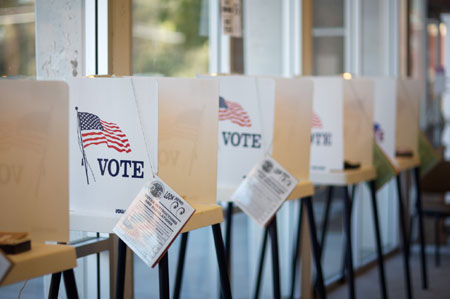
When it comes to notarizing election-related documents, we should coin a new warning phrase: ‘caveat notarius.’ In other words, let the Notary beware. That’s because elections regularly stir up hornets’ nests of controversies and challenges about the notarizations of documents. Here’s why.
The hostile focus on election documents
Notarizations for elections tend to be unlike ordinary notarial work. Consider this:
- For most notarizations, content of the notarized document is rarely controversial.
- The notarizations usually take place in calm and unexceptional locations.
- Most often, documents require only one or two signatures to be notarized.
- Third parties who see the notarized documents are not automatically predisposed to challenging them.
All of that peace and quiet changes dramatically in election settings. Political campaigns are inherently contentious and adversarial, especially after the 2016 and 2020 elections. Consequently, it is much more likely that election-related notarizations will be scrutinized and challenged. Every election cycle, there are innumerable news accounts about legal challenges to election-related notarizations.
Moreover, election procedures can be very complex, and following them correctly can be very challenging. All too often, candidates, political activists, and supporters find themselves in a rush to meet multiple deadlines and technical requirements. Missing a deadline or making a mistake can cost a candidate or initiative their place on the ballot.
Any number of election documents must be notarized, such as notice of candidacy forms, campaign finance reports and petition signature sheets. Depending on the state, Notaries also may be called upon to notarize each of dozens of signatures on a ballot petition, not the one or two of a routine notarization.
Of course, almost as soon as any election document is filed, opponents will examine it for any fault they can use to disqualify candidates and initiatives.
The devil is in the details
Anyone who notarizes election documents can expect to have every facet of their work put under the microscope. A Notary certificate with an incorrect venue, a missing date or a smudged and illegible seal impression could scuttle a candidacy or ballot initiative.
The best way to avoid challenges is to follow every step of a proper notarization meticulously, including:
- Require personal appearance.
- Properly identify every signer.
- Record the details of the notarization in your journal.
- Carefully complete the Notary certificate.
Many election-related notarizations require a jurat (also known as a verification on oath or affirmation), so remember to administer an oath or affirmation to the signer. Failure to administer the required oath or affirmation could invalidate the document and possibly disqualify a candidate or initiative.
And as always, proofread the certificate and your journal entry before finishing the notarization.
Keep in mind that with many local, state and federal elections, novice candidates will often be unfamiliar with the technical requirements for elections as well as the requirements for notarizations. It will be up to the Notary to make sure they carry out their duties properly.
Conflicts of interest
A Notary’s duty is to act as an impartial, third-party witness, and political campaigns are anything but impartial. Regardless of a Notary’s position about a candidate or issue, it is important to avoid any conflict of interest — or even the appearance of a conflict — that could jeopardize their impartiality and risk legal challenges that could disqualify a candidate or initiative.
As a best practice, a Notary should never notarize a petition that they have circulated or signed or a document circulated or signed by a family member.
Notary misconduct
In addition, in the rush and crush to file documents or collect enough signatures, Notaries can feel the pressure to cut corners. But when they do, that could cross the line into misconduct, which would be unlawful and could have serious consequences, including he loss or suspension of their Notary commission, criminal charges, fines and possible jail time.
In New York state alone, Notaries involved in 2 separate political campaigns were arrested and charged in 2018 for alleged notarial misconduct related to election fraud.
One of the most common accusations is that documents were notarized outside the presence of the signer.
The Notary’s public servant responsibility
Nothing said here should be interpreted to discourage Notaries from properly notarizing election-related documents. On the contrary, Notaries are vital to the electoral process. Indeed, we Notaries as commissioned governmental officials have the public responsibility to participate, to perform our duties carefully and honestly, and to thereby help assure the accuracy, fairness, and honesty of our electoral system. The purpose here is simply to inform Notaries about some of the realities involved in notarizing election-related documents and to assist them in carrying out their patriotic roles.
But remember: caveat notarius.
Michael Closen is Professor Emeritus at the John Marshall Law School in Chicago, Illinois. A respected consultant on model Notary statutes and legislation, Closen served on the drafting committees for The Notary Public Code of Professional Responsibility and various editions of the Model Notary Act, and recently authored Professor Closen's Notary Best Practices: Expert's Guide to Notarization of Documents.